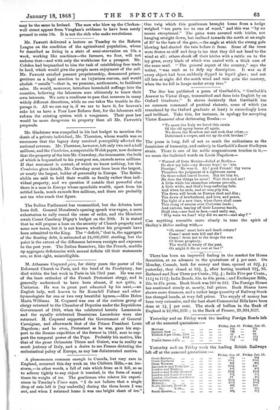Mr. Fawcett delivered a lecture on Tuesday to the Reform
League on the condition of the agricultural population, whom he described as living in a state of semi-starvation on 10s. a -week, working like machines—the farmers, we fear, will not endorse that—and with only the workhouse for a prospect. Mr. Cobden had bequeathed to him the task of establishing free trade in land, which would give the people more enjoyment of the soil. Mr. Fawcett extolled peasant proprietorship, denounced primo- geniture as a legal sanction to an injurious custom, and would abolish "entails "—that is, we presume, settlements, to facilitate sales. He would, moreover, introduce household suffrage into the 'counties, believing the labourers sure ultimately to know their *own interests. We note a readiness to pass that measure in many widely different directions, while no one takes the trouble to dis- parage it. All we can say is, if we are to have it, for heaven's sake let us have a Poor Law Reform first, for the labourers will reform the existing system with a vengeance. Their poor law would be more dangerous to property than all Mr. Fawcett's proposals.






























 Previous page
Previous page